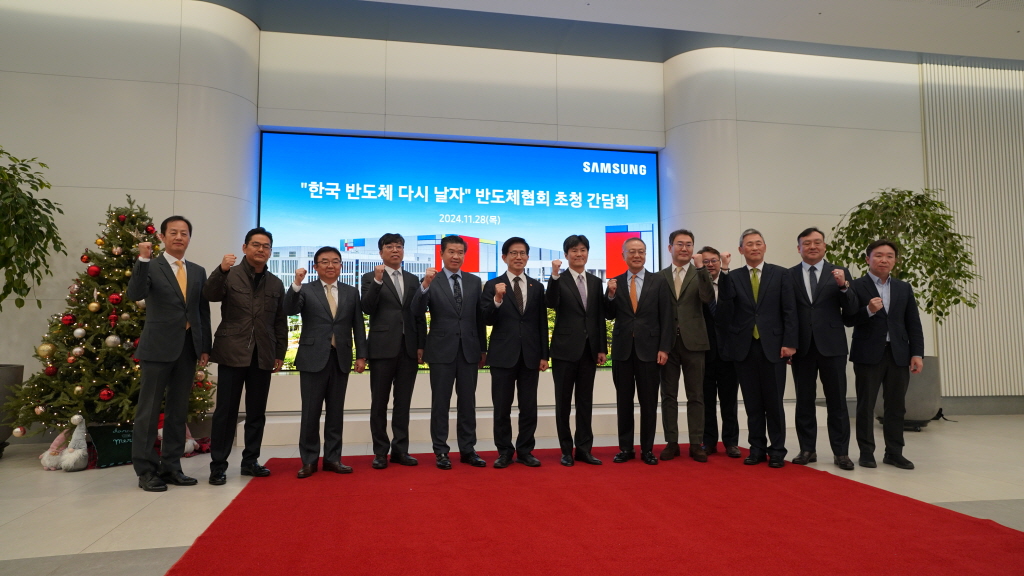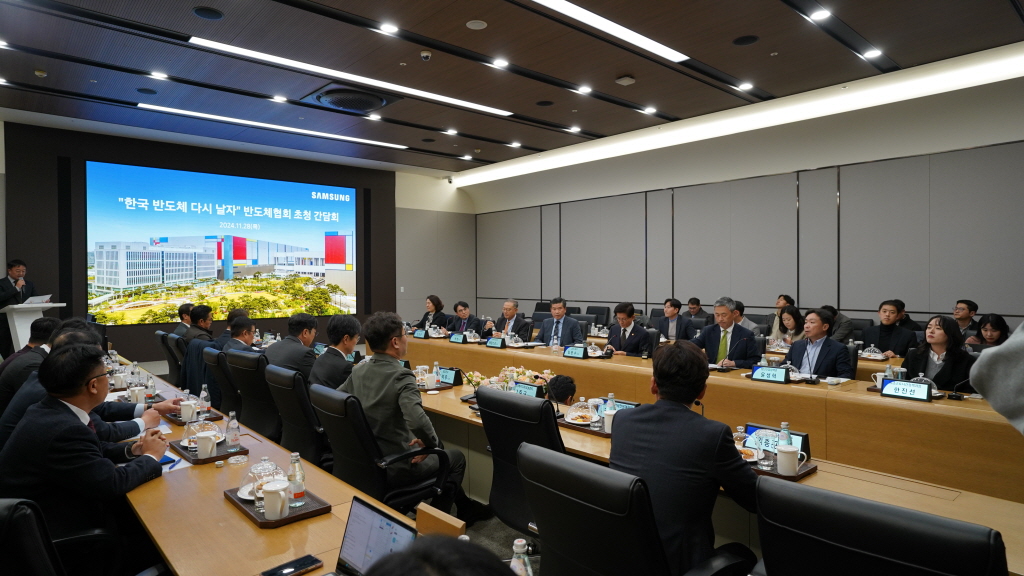한국반도체산업협회 개최로 28일 삼성전자 평택캠퍼스에서 김문수 고용노동부장관이 참석한 ‘반도체협회 초청 고용노동부 간담회’에서 참석자들은 “반도체 산업은 기업 간 경쟁을 떠나 이제는 국가 간 경쟁으로 들어선 비상상황이다. 글로벌 반도체 경쟁 총력전을 위해 노동 유연성 확보가 절실하다”고 입을 모았다.

▲반도체협회 초청 고용노동부 간담회 참석자들이 기념촬영을 하고 있다.
특별인정 근로만으로는 경쟁력 극복 어려워
반도체 특별법 등 통한 개선방안 마련 기대
“반도체 산업은 기업 간 경쟁을 떠나 이제는 국가 간 경쟁으로 들어선 비상상황이다. 글로벌 반도체 경쟁 총력전을 위해 노동 유연성 확보가 절실하다”
한국반도체산업협회는 28일 삼성전자 평택캠퍼스에서 김문수 고용노동부장관이 참석한 ‘반도체협회 초청 고용노동부 간담회’를 개최했다.
이날 행사에는 김문수 고용노동부장관을 비롯해 김정회 한국반도체산업협회 상근부회장, 남석우 삼성전자 사장, 차선용 SK하이닉스 미래기술연구원장, 허염 실리콘마이터스 회장 등 주요 반도체 기업들이 참석했다.
반도체 업계 관계자들은 반도체 산업이 대내외 경쟁환경이 심화되고 불확실성이 높아지는 상황에서 국내 반도체산업 경쟁력 제고를 위해 현행 근로시간 제도 개선이 필요하다는 입장을 정부에 전달했으며, 정부는 기업들의 현장 애로사항을 듣고 노사간 상생 방안을 모색하기로 했다.
김정회 반도체협회 상근부회장은 “반도체 산업의 구조 자체가 판이 바뀌는 각국 간의 경쟁으로 변화하고 있다”며 “단순히 삼성전자, SK하이닉스가 외국과 경쟁해서 되는 게 아니고 국가 간의 경쟁으로 돌아섰다”고 밝혔다.
또한 “AI 기술의 발전으로 거의 매년 새로운 칩이 개발되고 있으며, 과거보다 성능이 월등한 칩이 계속 출시되는 상황에서 반도체 업계는 많은 인력이 필요하나 새로운 칩을 만들어낼 성공가능성이 떨어지고 있다”며 “과거 우리나라는 반도체 후발주자 이었음에도 불구하고 스피드로 제계 최고 반도체 국가로 도약했으나 지금은 노동 시간 제약에 그런 스피드가 발목을 잡히고 있다”고 언급했다.
더불어 “우리나라는 반도체 메이커 외에도 반도체 설계, 장비, 소재, 부품 등 반도체 생태계가 많이 있는데 업무 특성이 상이한 측면이 있어, 보다 확대된 근로시간 유연성 부여가 시급하다”며 “52시간 근로제는 인력을 어떻게 확보하고, 활용할 것인지에 대해 많은 부담을 주고 있다”고 말했다.
이어 “지금 반도체 산업은 비상상황인 만큼 현재의 노동 유연성을 발휘하기 어려운 근로시간 제약을 국회에서 생산적인 논의를 거쳐 개정되기를 바란다”고 요청했다.
이어 발표한 김희성 강원대학교 교수도 “특별연장근로의 경우 3개월에 불구하고, 근로자 본인 동의와 노동부 장관의 인가가 필요하는 등 많은 한계가 있다”며 “우리 근로시간 제도는 반도체 연구개발처럼 특수한 분야에 유연하게 활용하기 어려운 측면이 있어 개선 필요성이 있다”고 밝혔다.
이에 산업계 참석자들은 현행 근로시간 제도에 반도체산업의 다양한 근로 환경 특성과 글로벌 경쟁환경 변화를 반영할 필요성이 있음을 건의하며, 반도체 특별법 등을 통해 개선방안을 마련해 달라고 요청했다.

▲반도체협회 초청 고용노동부 간담회 현장 모습